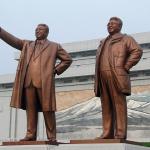Mark Lilla’s new book, The Once and Future Liberal, is gaining some attention as one of the most sustained critiques of the politics of identity. Those identitarian politics, some think, are also responsible for the election of the worst POTUS in history, for two reasons. Democrats catered to minority groups on the basis of personal loyalties rather than policies that might benefit a wider segment of society. And President Trump appealed to white male Americans who grew tired of having to take a number behind their hyphenated fellow citizens.
Rod Dreher interviewed Lilla and the following gives a flavor of his point:
RD: One of your most important insights is that liberal politics, by becoming driven by identity, have largely ceased to be truly political, and have instead become effectively religious (“evangelical” is the word you use). Can you explain?
ML: We are an evangelical people. How we ever got a reputation for practicality and common sense is a mystery historians will one day have to unravel. Facing up to problems, gauging their significance, gathering evidence, consulting with others, and testing out new approaches is not our thing. We much prefer to ignore problems until they become crises, undergo an inner conversion, write a gospel, preach it at the top of our lungs, cultivate disciples, demand repentance, predict the apocalypse, beat our plowshares into swords, and expect paradise as a reward. And we wonder why our system is dysfunctional…
Identity politics on the left was at first about large classes of people – African Americans, women – seeking to redress major historical wrongs by mobilizing and then working through our political institutions to secure their rights. It was about enfranchisement, a practical political goal reached by persuading others of the rightness of your cause. But by the 1980s this approach had given way to a pseudo-politics of self-regard and increasingly narrow self-definition. The new identity politics is expressive rather than persuasive. Even the slogans changed, from We shall overcome – a call to action – to I’m here, I’m queer – a call to nothing in particular. Identitarians became self-righteous, hypersensitive, denunciatory, and obsessed with trivial issues that have made them a national laughing stock (drawing up long lists of gender pronouns, condemning spaghetti and meatballs as cultural appropriation,…). This was politically disastrous and just played into the hands of Fox News.
What the new identitarians demand is more than mere recognition, though. They demand that you see this country exactly as they do, reach the same moral judgments about it, and confess your sins (which is what the word “privilege” is a secular euphemism for). The most recent books by Ta-Nahesi Coates and Michal Eric Dyson are quite explicit about this need for repentance. The subtitle of Dyson’s is A Sermon to White America. And the use of the term woke is a dead giveaway that we are in the mental universe of American evangelicalism not American politics.
Lilla’s use of the word “evangelical” is curious since he fails to include born-again Protestants among those who practice a politics of identity. Because evangelicals and the Religious Right to which they gave life were opposed to giving (generally) special treatment to minorities, talking about evangelicals as members of the politics-of-identity tribe does not make sense on the surface. But when you consider that evangelicals re-entered the public square precisely on grounds that when they so involved themselves in public affairs they could not leave their faith behind, or shut off their devotion to Jesus, they too were practicing a politics of identity. Just as blacks can’t escape race, women can’t flee gender, and homosexuals can’t get around sexual orientation, so evangelicals conceived of their faith as something that pervaded every-square inch of their being.
That is not a recipe for going into the public square to find the common good. Damon Linker, who comments on Lilla’s book, explains why the politics of identity get in the way of finding shared ways of living together:
In place of making broader-based civic appeals, identity liberals substitute a rhetoric of hectoring evangelism that nearly always backfires. “That one now hears the word woke everywhere is a giveaway that spiritual conversion, not agreement, is the demand.” Yet elections “are not prayer meetings” or “therapy sessions or occasions to obtain recognition. They are not seminars or ‘teaching moments.’ They are not about exposing degenerates and running them out of town.”
They are, instead, about persuasion. Which is why winning the country back from the right and bringing about real and lasting change will require Democrats to “descend from the pulpit.” The only solution to liberalism’s political defenestration, Lilla insists, is more and better politics — more and better appeals to the citizenship all of us share. It is citizenship that can provide “a political language for speaking about a solidarity that transcends identity attachments,” a solidarity that justifies not only individual rights and the self-assertion of sub-political identities but also policies rooted in our duties and obligations to one another.
Older varieties of Protestantism recognized that Christians were citizens of two kingdoms, one spiritual and heavenly, the other civil and earthly. But that idea gave too much room to secularism, or so it seemed. And so since 1980 evangelicals benefited ironically as much from the access to electoral politics provided by identitarianism as Democrats did.












